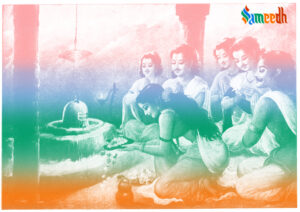The marriage of all the Pandav brothers to Draupadi is a unique and complex episode in the Mahabharat, shaped by a combination of destiny, circumstances, and adherence to dharm (righteousness).

Here is a brief explanation of how this unusual situation came about:
- Swayamvar of Draupadi: Draupadi, also known as Panchali, was the daughter of King Drupada. When it was time for her to choose a husband, a grand swayamvara (a ceremony where a princess chooses her spouse from among the assembled suitors) was organized. However, Drupada set a difficult task for the participants. The condition was to string a mighty bow and shoot an arrow through a revolving target. Many princes and Kshatriyas attempted the task, but none succeeded.
- Arjun’s Success: Arjun, one of the Pandav brothers, disguised as a Brahmin, entered the swayamvar. He successfully strung the bow and hit the target. The disguised Arjun and his brothers revealed their true identities as the Pandavs.
- Controversy and Kunti’s Command: After Arjun’s success, there was a controversy about who rightfully deserved Draupadi. Kunti, the mother of the Pandavs, unaware of Arjun’s success at the swayamvar, told her sons to share whatever they had brought among themselves. This was a result of a previous boon granted to her by Sage Durvas, which allowed her to invoke any deity and have a child by them. However, this boon was used inadvertently by Kunti when she called upon the god Dharm, and that’s why Draupadi had to be shared.
- Polyandry and Dharma: In adherence to their mother’s command and their commitment to dharm, the Pandavs accepted Draupadi as their common wife. This practice of a woman being married to multiple men is known as polyandry and was uncommon in ancient Indian society. However, the circumstances and the adherence to dharm played a crucial role in this unique arrangement.
- Agreement and Understanding: Draupadi herself had a unique destiny, and her marriage to the Pandavs was said to fulfill a divine plan. The Pandavs and Draupadi established a harmonious relationship, and each brother had a specific period of time with her. This arrangement, though unconventional, was accepted and respected by all parties involved.
In summary, the marriage of Draupadi to all the Pandav brothers was a result of a combination of destiny, adherence to dharm, and unique circumstances arising from the swayamvar and Kunti’s command. The characters involved accepted this arrangement, and it played a significant role in the events that unfolded in the Mahabharat.